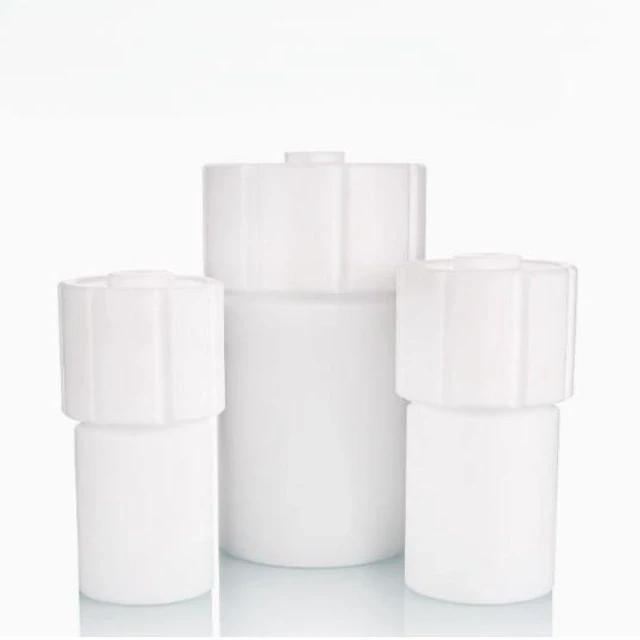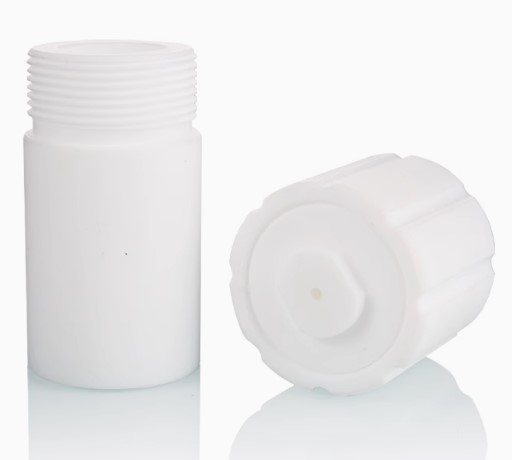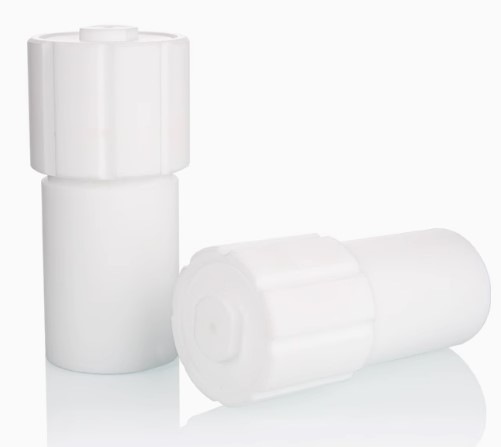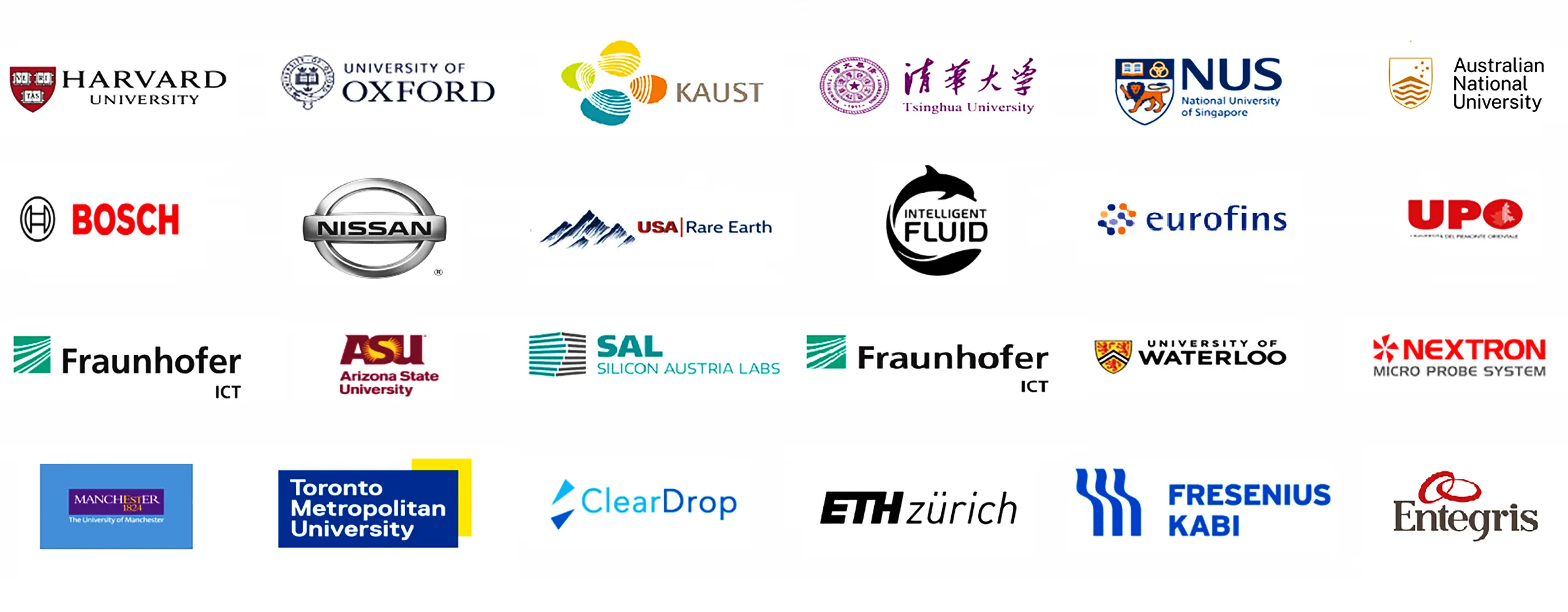
PTFE(Teflon) Labware
Custom PTFE Microwave Digestion Vessels for Demanding Applications
Item Number : PL-1003
Price varies based on specs and customizations
- Volume
- 30ml~200ml
Shipping:
Contact us to get shipping details Enjoy On-time Dispatch Guarantee.
Why Choose Us
Easy ordering process, quality products, and dedicated support for your business success.
Introduction
Our PTFE Microwave Digestion Vessels, also known as Teflon® digestion vessels, feature a robust, two-piece design. This includes a smooth, cylindrical body and a precisely engineered cap, often with a fluted or geared exterior for enhanced grip and secure sealing during high-pressure operations. Manufactured from high-purity Polytetrafluoroethylene (PTFE), these vessels exhibit a characteristic opaque white appearance. They are specifically designed for optimal performance and safety within microwave digestion systems, facilitating efficient heat transfer and pressure management.
Key Features and Advantages
These vessels leverage the outstanding properties of PTFE to deliver unparalleled performance:
- Exceptional Chemical Inertness: Resistant to virtually all corrosive chemicals, including strong acids (e.g., HF, HNO₃, HCl, H₂SO₄), bases, and organic solvents, ensuring sample integrity and preventing vessel degradation.
- Superior Thermal Stability: Capable of withstanding high operating temperatures (typically up to 260°C, with short excursions possible higher depending on design) common in microwave digestion processes without degradation or leaching.
- Ultra-Low Contamination: The inert nature of PTFE and its smooth, non-porous surface minimize analyte adsorption and prevent cross-contamination, ensuring accurate trace element analysis with extremely low blank values.
- Non-Stick Surface: Facilitates complete sample transfer and easy, thorough cleaning, reducing sample loss and carry-over between analyses.
- Robust and Safe Design: Engineered for durability and repeated use under the demanding conditions of pressure and temperature generated in modern microwave digestion systems.
- Excellent Dielectric Properties: Ideal for microwave applications, allowing efficient energy transfer to the sample for rapid digestion.
Details & Parts


Product Specifications
| Product Specification | Inner Mouth Diameter (mm) | Body Diameter (mm) | Height with Lid (mm) |
|---|---|---|---|
| PTFE Digestion Vessel 30ml | 25 | 42 | 105 |
| PTFE Digestion Vessel 50ml | 29 | 47 | 110 |
| PTFE Digestion Vessel 100ml | 50 | 62 | 143 |
| PTFE Digestion Vessel 200ml | 53 | 69 | 163 |
Contact Us for Your Solution
To discuss your specific requirements for PTFE microwave digestion vessels, explore customization options, or to learn more about how our products can benefit your analytical operations, please contact us. We are ready to assist you in finding the perfect, tailored solution.
Applications
Our PTFE Microwave Digestion Vessels are indispensable tools across a wide range of sectors and applications, including:
- Environmental Analysis: Digestion of soil, water, sludge, plant tissue, and air filter samples for heavy metal determination (e.g., EPA methods 3015, 3051, 3052).
- Food and Beverage Safety: Preparation of food, feed, and agricultural samples for nutritional analysis, and detection of contaminants and trace elements.
- Pharmaceutical and Clinical Research: Digestion of biological tissues, fluids, pharmaceutical formulations, and raw materials for elemental impurity analysis (e.g., USP <232>/<233>).
- Materials Science & Geochemistry: Dissolution of geological samples, ores, ceramics, alloys, polymers, and catalysts for compositional analysis.
- Semiconductor Industry: Trace metal analysis in high-purity materials, process chemicals, and silicon wafers.
- Petrochemical Industry: Digestion of crude oils, petroleum products, and catalysts.
- General Laboratory Use: Versatile for various sample preparation needs requiring aggressive digestion for techniques like ICP-MS, ICP-OES, and AAS.
Customization and Value for Customers
We understand that standard solutions may not always meet specific research or industrial requirements. That's why we offer extensive customization options for our PTFE digestion vessels. This includes variations in volume, dimensions, cap design, and compatibility features to fit your specific microwave digestion system brand and model, as well as your unique application needs.
Our commitment to precision manufacturing ensures that you receive a product tailored to:
- Enhance your analytical accuracy through minimal contamination.
- Improve operational efficiency with faster digestion times and easier handling.
- Provide long-lasting, reliable performance even under rigorous conditions.
- Ensure safety in your laboratory operations.
Trusted by Industry Leaders

FAQ
What Are The Main Applications Of PTFE Labware?
What Are The Main Applications Of PTFE Parts?
What Are The Main Applications Of PTFE Gaskets?
What Are The Common Applications Of PTFE Barrels?
What Are The Main Applications Of PTFE Glands?
What Are The Main Applications Of PTFE Discs?
What Are The Main Applications Of Teflon Seals?
What Are The Main Applications Of PTFE Rings?
What Are The Key Features Of PTFE Labware?
What Are The Key Features Of PTFE?
What Are The Key Features Of PTFE Gaskets?
What Are The Key Features Of PTFE Barrels?
What Are The Key Features Of PTFE Glands?
What Are The Key Features Of PTFE Discs?
What Are The Key Features Of Teflon Seals?
What Are The Key Features Of PTFE Rings?
What Makes PTFE Suitable For Labware?
How Do PTFE O-ring Seals Work?
What Is The Principle Behind PTFE Gaskets?
How Does A PTFE Lined Butterfly Valve Work?
How Do PTFE Discs Work In Sealing Applications?
How Do Teflon Seals Work In Harsh Environments?
How Are PTFE Rings Manufactured?
What Are The Advantages Of Using PTFE Labware?
What Are The Advantages Of Using PTFE Parts?
What Are The Advantages Of Using PTFE Gaskets?
What Are The Advantages Of Using PTFE Barrels?
What Are The Advantages Of Using PTFE Glands?
What Are The Advantages Of Using PTFE Discs?
What Are The Advantages Of Using Teflon Seals?
What Are The Advantages Of Using PTFE Rings?
What Types Of PTFE Labware Are Available?
Why Is PTFE Suitable For CNC Machining?
How Are PTFE Gaskets Installed?
Why Are PTFE Barrels Suitable For Laboratory Use?
Are Custom PTFE Glands Available For Specific Applications?
Why Are PTFE Discs Preferred In High-temperature Environments?
Are Teflon Seals Environmentally Friendly?
Why Are PTFE Rings Preferred In The Semiconductor Industry?
What Types Of PTFE Parts Are Commonly Manufactured?
Are PTFE Discs Resistant To Chemicals?
Are PTFE Rings Suitable For Medical Applications?
What Makes PTFE Discs Non-stick?
Can PTFE Discs Be Used In Electrical Applications?
How Do PTFE Discs Perform In Low-temperature Environments?
Are PTFE Discs Customizable For Specific Applications?
4.8 / 5
Incredible durability and precision—exactly what our lab needed for high-temperature applications!
4.7 / 5
Fast delivery and top-notch quality. These vessels handle corrosive materials like a dream.
4.9 / 5
Worth every penny! The PTFE construction is flawless, and the customization options are a game-changer.
4.8 / 5
Technologically advanced and built to last. Our digestion processes have never been smoother.
4.7 / 5
Perfect for demanding applications. The vessels arrived sooner than expected—great service!
4.9 / 5
Exceptional value for money. These vessels outperform competitors by a mile.
4.8 / 5
Reliable and efficient—our lab’s digestion results are now consistently accurate.
4.7 / 5
Superb craftsmanship. The PTFE material resists wear even under extreme conditions.
4.9 / 5
A must-have for any serious lab. The customization and durability are unmatched.
REQUEST A QUOTE
Our professional team will reply to you within one business day. Please feel free to contact us!
Related Products

Customizable PTFE Crucibles for Laboratory and Industrial Applications
High-purity PTFE crucibles with lids for labs. Chemical-resistant, non-stick, and durable. Ideal for sample digestion, AA, ICP-MS. Custom sizes available.

Custom PTFE Parts Manufacturer for Teflon Parts and PTFE Tweezers
KINTEK prioritizes precision production and offers custom fabrication from prototypes to high-volume orders.

Custom PTFE Parts Manufacturer for Teflon Containers and Components
High-precision PTFE containers for labs & industry. Chemical-resistant, customizable sizes. Ideal for semiconductor, medical & lab applications. Get a quote!

Custom PTFE Measuring Cylinders for Advanced Scientific and Industrial Applications
Discover the superior performance of our Polytetrafluoroethylene (PTFE) measuring cylinders, engineered for precision and resilience in demanding environments.

PTFE Deep Evaporating Dishes Customizable Laboratory and Industrial Solutions
High-quality PTFE deep evaporating dishes for labs. Chemical-resistant, non-stick, and customizable. Ideal for sample handling. Get yours now!

Customizable PTFE Three Neck Flasks for Advanced Chemical Applications
Our high-performance Three-Neck Round-Bottom Flasks are expertly crafted from pure Polytetrafluoroethylene (PTFE), a material renowned for its exceptional properties, making it ideal for demanding laboratory and industrial environments.

Custom PTFE Shallow Evaporating Dishes for Diverse Applications
High-purity PTFE shallow evaporating dish for labs. Chemical-resistant, non-stick, ideal for sample evaporation. Custom sizes available. Order now!

Custom PTFE Evaporating Dishes for Diverse Applications
High-purity PTFE evaporating dishes for labs, resistant to acids & solvents. Non-stick, durable, ideal for sample prep. Custom sizes available. Order now!

PTFE Chemical Solvent Sampling Spoon
Discover our high-purity PTFE (Polytetrafluoroethylene, commonly known as Teflon) Sampling Spoons, meticulously engineered for the safe, precise, and contamination-free handling of chemicals, solvents, powders, and various samples.

Custom PTFE Sleeves and Hollow Rods for Advanced Applications
High-performance PTFE hollow rods & sleeves for chemical resistance, thermal stability, and low friction. Custom sizes available. Contact KINTEK today!

Customizable PTFE Seals Filter Holders for Versatile Applications
Enhance filtration with KINTEK's PTFE-sealed filter holders for leak-proof, chemical-resistant performance in labs and industries. Explore now!

Custom PTFE Bottles for Diverse Industrial Applications
High-purity PTFE bottles for chemical storage, resistant to acids & solvents. Wide/narrow mouth options, leak-proof, durable. Ideal for labs & industry.

Custom PTFE Volumetric Flasks for Advanced Scientific and Industrial Use
Premium PTFE volumetric flasks for labs – chemical-resistant, non-stick, precise measurements. Ideal for semiconductor, medical & analytical applications. Shop now!

Custom PTFE and Nitrile Diaphragm Pump Components for Demanding Applications
High-performance PTFE & Nitrile replacement balls and seats for QBY/QBK pumps. Chemical-resistant, durable, and precision-engineered for optimal pump efficiency.

Custom PTFE Teflon Balls for Advanced Industrial Applications
Precision PTFE balls for chemical, medical & industrial use. High-performance, low-friction, chemical-resistant. Custom sizes available. Get a quote today!

Custom PTFE Square Trays for Industrial and Laboratory Use
Premium PTFE square trays for labs & industry. Chemical-resistant, non-stick, high-purity PTFE trays for semiconductors & medical use. Custom sizes available.

Custom PTFE Teflon Parts Manufacturer PTFE Magnetic Stirring Bar
KINTEK PTFE magnetic stirring bars offer chemical resistance, high-temperature stability, and smooth mixing for labs. Ideal for diverse applications.

Custom PTFE Teflon Parts Manufacturer PTFE Cleaning Rack
High-purity PTFE flower baskets for labs & semiconductor use. Chemical-resistant, -180°C to +250°C, custom sizes available. Contact KINTEK today!

Customizable PTFE Scrapers and Shovels for Demanding Applications
High-purity PTFE scrapers & shovels for labs, semiconductor & chemical industries. Chemical-resistant, non-stick, durable tools for precise material handling. Custom solutions available.
Related Articles

Your Recurring Nightmare: Why High-Purity Fluid Systems Fail and How to Stop It for Good
Discover the root cause of recurring pipe corrosion and contamination in critical systems. It's not wear and tear—it's a chemical war you can win.

Your "Inert" PTFE Component Might Be the Real Source of System Failure
Inconsistent results? Learn why standard PTFE components fail under stress and how precision-fabricated, application-specific grades are the key to reliability.

The Price of Purity: When a Simple Bottle Becomes Mission-Critical
Discover why PTFE bottles are not just containers, but precision tools that mitigate invisible risks in high-stakes chemical and sample handling.

When "Chemically Inert" Isn't Enough: The Hidden Cause of PTFE Component Failure
Discover why standard PTFE components fail in critical applications, even with 'safe' chemicals. Learn the hidden role of fabrication quality and how to prevent costly downtime.

The Unseen Component: How PTFE Became the Bedrock of Medical Device Reliability
Discover how PTFE's unique trio of biocompatibility, low friction, and chemical inertness solves critical safety and performance challenges in medical devices.

The Physics of a Perfect Fit: How PTFE Eliminates an Athlete's Hidden Distractions
Discover how PTFE's unique physics enhances athletic performance by ensuring a secure fit and maintaining traction, eliminating critical distractions.

That Ghost Peak in Your Data? It’s Not Your Fault.
Frustrated by inconsistent results in pharmaceutical analysis? Discover the hidden cause of contamination and how precision PTFE components ensure data integrity.

Why 'Medical-Grade' Isn't Enough: The Hidden Risk in Your PTFE Components
Generic 'medical-grade' PTFE poses hidden risks. Discover why material purity and manufacturing precision are the real keys to device safety.

Why Your High-Performance PTFE Parts Fail—And Why It's Not the Material's Fault
Discover the hidden reason your critical PTFE components fail. It's not the material, but the fabrication. Learn how to get reliable parts.

Engineered for Trust: How High-Cycle PTFE Components Underpin Pharmaceutical Reliability
High-cycle PTFE components aren't just durable; they mitigate risk by reducing maintenance interventions, ensuring process integrity and product purity.

Beyond Sanitization: Why Your Material Choice Is the Real Key to Preventing Contamination
Recurring contamination in food & pharma isn't a process failure, but a material failure. Discover why PTFE is the key to lasting hygiene and uptime.

The 260°C Illusion: Why Your PTFE Bottle's True Limit is a System, Not a Number
PTFE's thermal limit isn't just a material spec. True safety and integrity depend on understanding the entire system, where the cap is often the weakest link.